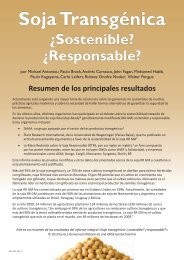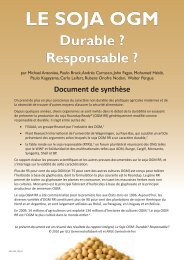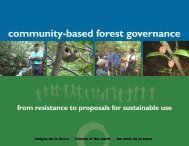Plantations, poverty and power - Critical Information Collective
Plantations, poverty and power - Critical Information Collective
Plantations, poverty and power - Critical Information Collective
You also want an ePaper? Increase the reach of your titles
YUMPU automatically turns print PDFs into web optimized ePapers that Google loves.
4<br />
Introduction<br />
The area of industrial tree plantations is exp<strong>and</strong>ing in the global South. Vast areas of monocultures have<br />
been established to feed raw material to the pulp <strong>and</strong> paper industry. This report investigates the role of<br />
European companies <strong>and</strong> institutions in promoting this expansion <strong>and</strong> to look at the impacts on local<br />
communities <strong>and</strong> their environments in the South. It dem<strong>and</strong>s an end to financing business as usual in the<br />
plantations <strong>and</strong> pulp <strong>and</strong> paper sector, <strong>and</strong> an end to development “aid” to the sector.<br />
European companies, aid agencies <strong>and</strong> institutions play a significant role in promoting the expansion of<br />
the industry in the South. The largest pulp <strong>and</strong> paper machinery exporters are Germany <strong>and</strong> Finl<strong>and</strong>. In<br />
2005, Germany exported more than US$2 billion worth of pulp <strong>and</strong> paper machinery <strong>and</strong> Finl<strong>and</strong> more<br />
than US$1 billion.1 European companies <strong>and</strong> institutions promote the expansion of the pulp <strong>and</strong> paper<br />
industry in the global South not as a form of “development” but because it is beneficial to Europe.<br />
The first section of this report looks at the process by which plantations are established <strong>and</strong> pulp mills are<br />
built. What happens before a pulp mill can be built Often the first stage is to build the political<br />
framework, to convince the public that large scale industrial tree plantations would be beneficial for the<br />
country. Plantation proponents, who include elites in the South, as well as Northern actors, repeat a series<br />
of lies to justify the expansion of plantations in the global South. Depending on the audience, they tell us<br />
that plantations provide jobs, relieve pressure on forests, are only established on degraded l<strong>and</strong>, restore<br />
soils, sequester carbon <strong>and</strong> help meet the global dem<strong>and</strong> for paper. The biggest lie of all is that plantations<br />
are forests.<br />
The reality for people living in the areas where plantations have been established is that plantations have<br />
destroyed their livelihoods <strong>and</strong> sucked streams <strong>and</strong> rivers dry. The few jobs created are dangerous, poorly<br />
paid <strong>and</strong> often seasonal. Plantation proponents do not point out that pulp mills are among the most<br />
polluting of industrial processes <strong>and</strong> that one of the reasons that the South looks so attractive is that<br />
regulation is less strict in many countries in the South.<br />
Other reasons for the expansion to the South include the fact that trees grow faster in the tropics, meaning<br />
that plantations can be logged on much shorter rotations than in the North. Labour is cheaper in the South<br />
<strong>and</strong> governments provide a series of subsidies to encourage the expansion of the industry in the South. In<br />
several countries the area of industrial tree plantations exp<strong>and</strong>ed rapidly under brutal military<br />
dictatorships, when protest against the impacts of plantations was either extremely dangerous or<br />
impossible.<br />
The nature of global finance is another reason for the expansion in the South. To investors looking to<br />
finance the pulp industry, a US$1 billion pulp mill in Brazil is a much more attractive investment than,<br />
say, a small scale mill in the UK fed with locally collected waste paper. This is related to the notoriously<br />
cyclical nature of the industry. When pulp <strong>and</strong> paper prices are high, the industry exp<strong>and</strong>s, leading to<br />
overcapacity <strong>and</strong> inevitably a price crash. Once the price starts to recover, the industry exp<strong>and</strong>s again <strong>and</strong><br />
the next boom-bust cycle is under way.<br />
1 “Paper mill <strong>and</strong> pulp mill machinery, paper-cutting machines <strong>and</strong> other machinery for the manufacture of paper articles”,<br />
Index Mundi website. http://www.indexmundi.com/trade/exports/product=725















